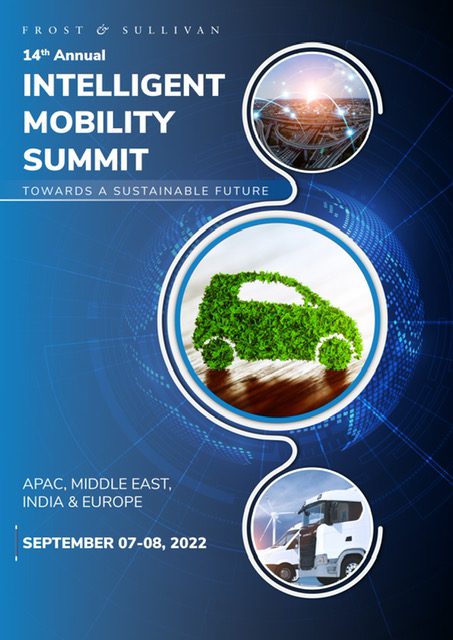The sector adapts and morphs in its quest for a sustainable future
The recently concluded Frost & Sullivan’s Annual Intelligent Mobility Summit 2022, (APAC, Middle East, India & Europe) held virtually on 7 and 8 September 2022, was themed: ‘Towards a Sustainable Future’. This year marked the 14th edition of the flagship mobility event.
“The intensifying climate change crisis and rapid resource depletion have magnified the need to identify alternative business paradigms. Industries worldwide, including mobility, are moving towards models of sustainable, innovation-led growth, where environmental and social considerations are being merged into business and investment decisions,” affirmed Darrell Huntsman, Chief Executive Offer, Frost & Sullivan.
The push towards decarbonization and sustainability is particularly crucial for the mobility industry, which has long been indicted for its disproportionately large carbon footprint and high emissions levels. Accordingly, the mobility industry is being seen as a key catalyst in the quest to achieve global net-zero emissions by 2050.
CASE
Advanced technologies mirrored in connected vehicles, autonomous driving, shared mobility and electromobility (CASE) trends, changing customer preferences, and regulatory pressures are fast-tracking sustainable models of growth in the mobility industry.
Across the mobility spectrum, stakeholders are designing comprehensive sustainability blueprints that cover products like zero-emission vehicles and software-defined vehicles, processes like carbon-neutral manufacturing and circular economy, and business models like “lifestyle-as-a-service.”
“The mobility industry is undergoing fundamental shifts in its push towards decarbonization and a resilient, resource-responsible future,” noted Vivek Vaidya, Associate Partner and Senior Vice President, Mobility Practice, Asia Pacific, Frost & Sullivan. “While stakeholders have shown purposeful intent, there is still tremendous potential to integrate sustainability more effectively into business models to drive greater innovation, growth and profitability,” he added.
Networking sessions
Indicative of the scope and scale of the challenge at hand, the Summit brought together a diverse network of industry experts, innovators, and policymakers, with over 2,000 delegates participating in thought-provoking debates, panel discussions, and networking sessions.
Over 30 thought leaders from industry and government shared their insights on an array of hot topics. Featured speakers included Ponz Pandikuthira, Vice-President, Global Product Marketing, Nissan; William Wei, CTO Foxconn/MIH; Daniel Majewski, Head of R&D Strategy and System Solutions, ZF Group; and Benjamin Maillard, GM North America Free2move, among many others.
Discussions covered an eclectic range of topics, including decarbonization as a driving force in sustainable mobility, strategies to achieve a carbon-neutral vision, current and upcoming trends in the electric vehicle market, creating smartphones on wheels, implications of government regulations on automotive industry prospects, the battle for supremacy between traditional automakers and technology start-ups, and the circular economy of batteries. Discussions also focused on the future of automotive retail, commercial trucking, and mobility.







